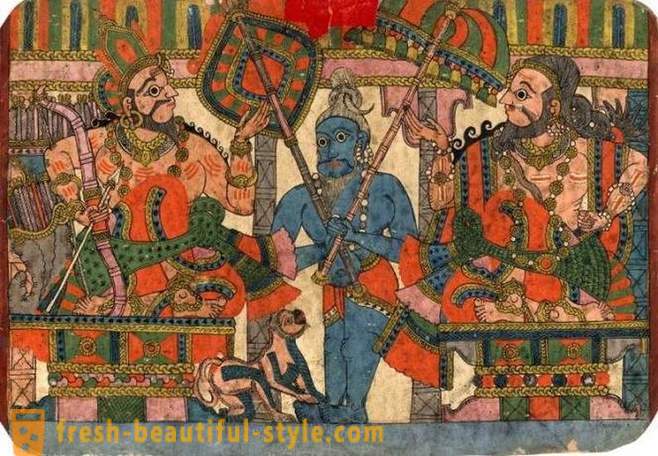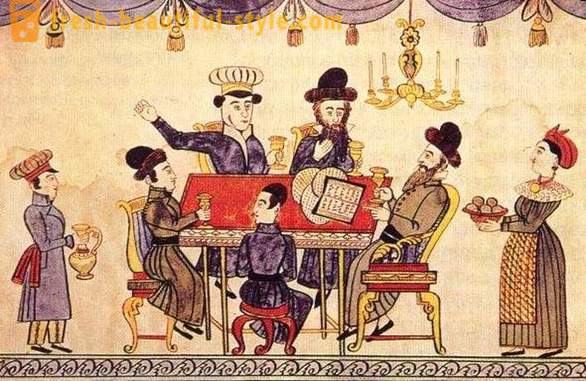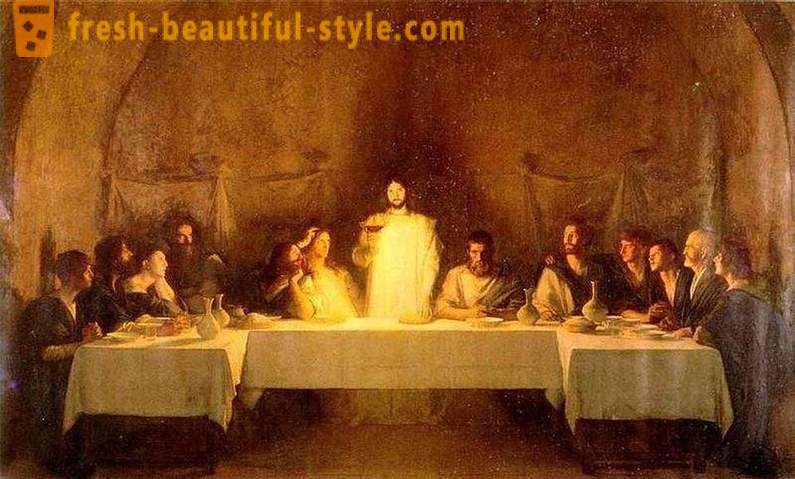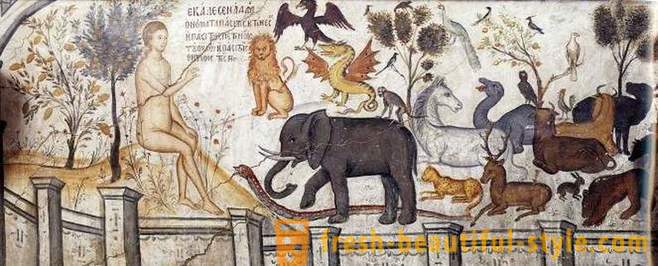Religious rules: why Jews and Muslims are forbidden to eat pork
Why in different cultures, some products considered taboo? Why Hindus forbidden to eat beef, and Muslims and Jews - pork?

We decided to figure out how to form these bans, and what is behind them.
Kosher, hooves and shellfish
Kashrut or Kosher - a set of strict dietary restrictions, based on the laws of the Torah and Talmud. Kosher allows you to eat meat only those animals that are both cloven-hoofed and ruminants - from sheep to giraffes.

However, pork and hare kosher prohibits eating, because pigs do not chew the cud, but rabbits do not have hooves. There was also an explanation of the behavior of "polukoshernyh" animals: pigs in a dream, supposedly, proudly display their "correct" hoof, but hide the face, and rabbits - on the contrary, running out of shame foot.
kosher animals, the meat must be prepared professional butcher Shochet, slaughter cattle one particular movement, in any case, without puncturing the meat or delaying the course of the knife. Shochet pass long training before you begin any of the responsibilities. Laws butcher in the Jewish tradition weight: it is important to not only participate in Shochet slaughter cattle, but also a test animal to a disease that carries mashgiah and cleaning Menaker carcasses from fat, and lived banned kosher. Eating seafood is also strictly regulated: they must have fins and scales, that is, and shellfish have strictly prohibited. Every housewife is obliged to sift the flour in order to avoid getting into the worms and carefully inspect the vegetables fruit in search of larvae.
The ban on eating insects gives only one exception: you can eat locusts (Lev 11:22.). Also kosher prohibits eating foods containing blood (hence the meat when cutting with salt, its absorbency), birds, eggs of the same, dull or sharp ends (usually the same ends are in the eggs of birds of prey), and alcohol, which is not made religious Jews to meet a variety of special rules. It is strictly forbidden "to boil a kid in its mother's milk", mix milk with meat per meal. However, the check has finished kosher food is hardly possible formal methods, and because this right is usually provided by the rabbi.
halal
Food preferences of Muslims also severely limited. All food in Islam is divided into three groups: halal, haram and makruh, which correspond with Indian Sattva, Rajas and Tamas, and of these, only halal fully enabled for use. The Koran, like the Torah - in the first set of laws defining the way of life of Muslims. The Koran forbids the eating of pork, carrion, wrongly slaughtered livestock (without mentioning the name of Allah) and blood (5: 3).
However, the violation of the ban, as is often expressly mentioned in the Qur'an, it is possible in extreme cases: "If anyone suffering from hunger, and not from the inclination to sin, will be forced to eat the forbidden, then surely Allah - Forgiving, Most Merciful." In addition, Islam is forbidden to kill animals for no reason, and some Muslim theologians believe that the miner cattle profession is sinful. Halal rules less stringent than the laws of kosher: no special person among the Muslims who slaughter and slaughter rules themselves are also a bit different from the Hebrew. On the other hand, Islam forbids authorized kosher spirits.
Not by bread alone

For Christianity taboo food is less common and severe, but the sanctification of food, too, is typical. Prohibited the eating of "things sacrificed to idols", ie, pagans brought a sacrifice to the gods, skvernoyadie as well - during Lent - meat, milk, eggs, butter, fish and some other products.
The absence of significant food taboo due to the fact that the New Testament abolished the prohibition of those that had been prescribed in the Old, and coincided with the already listed Jewish law. According to the teachings of Christ, the food can not defile the spiritual man: "Everything that is sold in the shambles, eat, asking no question for conscience 'sake; for the earth is the Lord, and everything in it "(1 Corinthians 10: 25-27.).
Ahimsa

For Hinduism is characterized by the rejection of beef, due to the fact that the cow is a sacred animal. Many followers of this religion follow ahimsa - teaching, preaching non-violence, and, accordingly, the special vegetarian diet.
Followers of Jainism, another religion of India, even put on special bandages mouth and sweep the road in front of a broom in order not to kill the chance of living beings. Needless to say, they do not eat it in any form. Hindus are trying not to have radzhasnuyu food - has a very pronounced flavor, such as coffee or tea, and tamasnuyu - "tasteless, smelly, stale ', such as meat, eggs and garlic.
Where the prohibitions?
Origins of kosher can lurk in moral precepts. With proper slaughtering an animal dies almost painless. The taboo against eating the blood may also be due to considerations of humanity and the reluctance to shed blood as a symbol of the soul of God's creatures. The ban on eating bird of prey and their eggs is associated with the fear that the aggressive predators will give people. The Torah even says that before the great flood, all the people were vegetarians, but after the Lord gave them to eat animals.
It is also interesting and possible interpretation of the ban on the mixing of milk and meat, which later evolved to the taboo of eating per meal: meat, as a symbol of death and murder, should not be confused with the symbolic of the new life, that is mother's milk, promoting growth young. It is possible that this taboo is also reflected earlier religious ideas of the ban on the boiling milk, as they milk was magical connection with its source, that is, it is part of a - a cow or a goat. Accordingly, the boiling milk likens it to boil in the udder that was supposed to hurt the animal and deprive people of milking. In addition, many African tribes still have bans on any mixture of milk and meat, including in the human stomach, which can be explained by the fear of the cow's health - in fact one of its dead portion of meat, mixed with live, milk, and symbolically cow eats itself, whereby its milk contaminated. It is likely that a ban on mixing of milk and meat apparent exclusion of the two types of cultures - farming and cattle, compete with each other. Prohibition of eating pork in Islam and Judaism are likely preventive sanitary measure, because perishable pork, in terms of the ancient world, devoid of refrigerators and modern medicine could be fatal pudding. In addition, the pig with her promiscuity and eating habits and obvious love of mud spawned a symbolic identification with a dirty, grubby and sexually permissive people. Accordingly, the use of its meat for food could promise a man purchase of all of the above qualities. Sometimes a negative attitude to the pigs gave rise to the curious cases: in the XVIII century, some rabbis felt tomato fruit swine and forbade its use in food.
And an Indian ban on beef eating may be closely linked to economic reasons: in India cow dung was used in the construction and heating purposes, they were used as beasts of burden and give the milk that makes them more valuable than any other animal. So the image of the nurse cows became sakralizirovatsya, and in the IV century BC. e. a ban on the killing of cows and bulls became the official law. Prohibition of bread and wine, not prepared Jews, refers to the Jewish desire to consolidate co-religionists and to prevent the assimilation of other peoples. Accordingly, at any festival, hosted by the representatives of other religions, a Jew will be very difficult to keep kosher. In modern cultures such socio-mediated causes of prohibiting food in Judaism or Islam played a crucial role for religious unity.













































